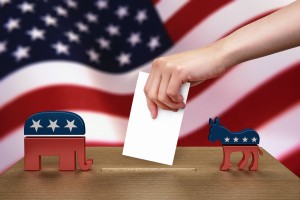2020 Election Day Brings Sports Betting Measures On The Ballots In 3 States
As of now, 22 states and the District of Columbia allow individuals to place wagers on sporting contests.
 While the focus of Election Day 2020 will be on whether President Donald Trump remains in the White House for four more years or challenger Joseph Biden wins the race, there are many state and local elections that will play a major role in the future of America. In three jurisdictions, a sports law measure is on the ballot, which could alter offerings for consumers and play a role in the projections for certain publicly traded companies.
While the focus of Election Day 2020 will be on whether President Donald Trump remains in the White House for four more years or challenger Joseph Biden wins the race, there are many state and local elections that will play a major role in the future of America. In three jurisdictions, a sports law measure is on the ballot, which could alter offerings for consumers and play a role in the projections for certain publicly traded companies.
Maryland, Nebraska, and South Dakota constituents are not only voting for candidates but also whether sports gambling should become legalized within their respective borders. As mentioned above, a vote in favor of changing the current landscape could open the door for the likes of FanDuel, DraftKings, MGM, and others to begin competing in those jurisdictions, which is part of the roadmap that they have all been discussing with their shareholders for quite some time.
As of now, 22 states and the District of Columbia allow individuals to place wagers on sporting contests. Those jurisdictions currently make up just less than half of the adult U.S. population. Maryland’s roughly 6 million constituents comprise more than double of those in Nebraska and South Dakota combined and is thus the most important state for sports betting operators in this election.

Attention Buyer: Not All Legal AI Models Are Created Equal
Maryland’s 2020 ballot contains Question 2, which is described as the Sports Betting Expansion Measure. A vote of “yes” supports authorizing sports and events wagering at certain licensed facilities with state revenue intended to fund public education. Maryland Governor Larry Hogan supports the measure as do FanDuel and DraftKings, which contributed $1.5 million and $250,000 respectively to the effort in having it passed.
Question 2 has received support from the Washington Post editorial board as well. It notes that sports betting has already been legalized by all states bordering Maryland (as well as the District of Columbia) and says that annual tax revenue is estimated to be between $20 million and $40 million, which it says would be a useful bump at a time when the coronavirus pandemic has depleted taxes from casino gambling.
A total of $920 million in revenue was generated by the U.S. sports betting industry in 2019, per a report from industry watchdog Eilers & Krejcik Gaming. That number is expected to shoot up to $19 billion if all 50 states begin to allow for sports wagering. For the industry to get anywhere near that number, it needs states big and small, including Nebraska, South Dakota, and Maryland to adopt new laws and rules that permit sports betting within their borders. On Election Day 2020, voters in those states have the power to begin bringing about change.
Sponsored

New Report - Are Small Firms Achieving Their Legal Tech Goals?

How To Maximize Productivity With Westlaw Precision With CoCounsel


Attention Buyer: Not All Legal AI Models Are Created Equal

Mitigating M&A Cyber Risk: Pre- & Post-Acquisition Due Diligence
Darren Heitner is the founder of Heitner Legal. He is the author of How to Play the Game: What Every Sports Attorney Needs to Know, published by the American Bar Association, and is an adjunct professor at the University of Florida Levin College of Law. You can reach him by email at [email protected] and follow him on Twitter at @DarrenHeitner.
Sponsored

The Ethical use of Generative AI









